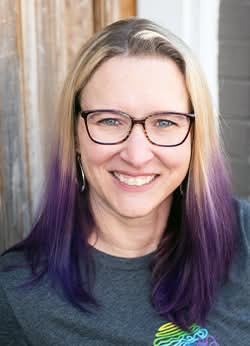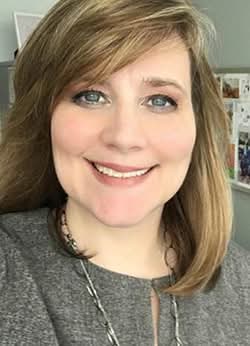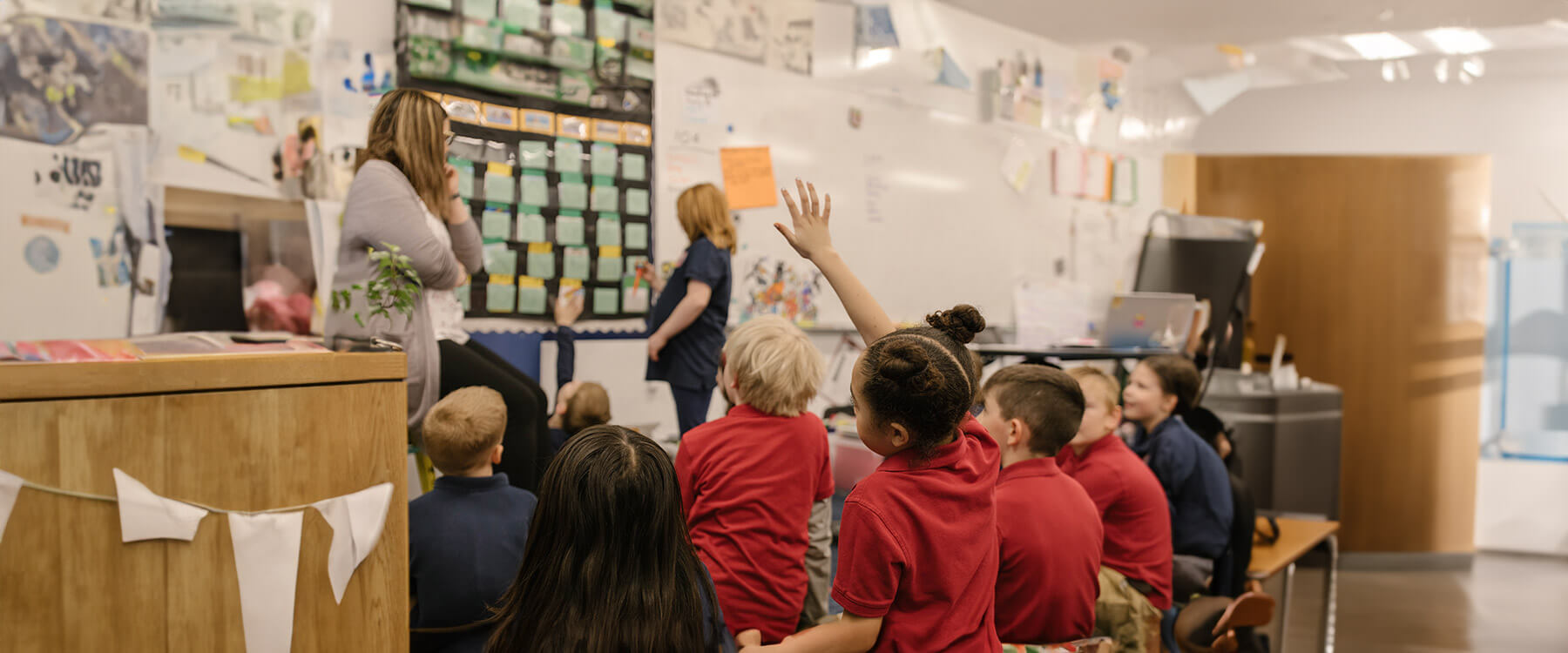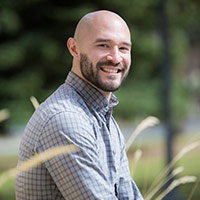Upcoming Gifted Education Institute
Experience institutes that will help you grow as a professional and learn to address contemporary issues in gifted education.
Summer 2025 Teaching for Learning Institute
Differentiation Strategies & Talent Development for HiCap Learners
HiCap students need advanced instruction matched to their strengths and levels of understanding in order to learn and grow. In this engaging and practical three-day institute we will focus on providing the latest research, resources and strategies that respond to the following questions: How do you differentiate instruction in ways that develop students’ talents and strengths? How can we create access and opportunities for talent development? How do we support students who are twice-exceptional? How do you identify HiCap students and assess their growth? What evidence-supported curriculum resources and instructional strategies encourage student learning?
- Collaborate with others in the field of gifted education.
- Create new lessons, units and program designs based on evidence-supported frameworks and strategies.
- Contribute your ideas and successes in serving gifted students.
- Dates: June 25-27, 2025
- Location: On campus
Whitworth University
300 W. Hawthorne Road
Spokane, WA 99251 - Time: 9 a.m.-4 p.m.
- Cost: $399* per person (includes lunch)
*School-based teams that register together will receive every sixth registration free; Whitworth University is a Washington state-approved clock hour provider.
Join us for three days of engaging sessions focused on ways we can use or adapt curriculum resources, identify strengths, develop talent, support learners with twice-exceptionalities, and differentiate instruction and support psychosocial skill development. Each day includes a keynote, breakout session, an in-depth multi-day strand, as well as opportunities to share your ideas and network with others around specific topics of interest.
More information coming soon!
Daily Schedule
| Time | Activity |
|---|---|
| 9-10 a.m. |
Welcome & Keynote Presentation |
| 10:10 a.m.-12:10 p.m. | Session Strands (choose one strand to attend all three days) |
| 12:10-1:15 p.m. |
Lunch (provided) |
|
1:15-2:15 p.m. 2:25-3:25 p.m. |
Daily Breakout Session #1 (choose a different session each day) Daily Breakout Session #2 (choose a different session each day) |
| 3:30-4 p.m.* |
Roundtables, Networking & Reflection (choose a different one each day; must attend both roundtable sessions to receive one clock hour) *On Friday, June 27, the conference ends at 2:15 p.m. after the first afternoon breakout session. This allows individuals ample time to travel home. |
Additional Information
Academic Credit
You may elect to receive one graduate-level credit from Whitworth University for an additional fee of $150. There will be course assignments for those receiving graduate-level credit, to be completed after the conference is over. This credit can be used to meet the elective requirement for the Washington State Gifted Education Specialty Endorsement offered at Whitworth. One graduate-level semester credit equals 15 Washington state-approved clock hours. Registration for credit will occur during the institute after an informational meeting, held on Thursday, June 26 at 4:00p.m.
Clock Hours Pending
Washington state-approved clock hours will also be available for $3 per clock hour with a total of 15 clock hours available. Contact gifted@whitworth.edu if you have questions. Additional information will be sent regarding signing up for clock hours to all registrants prior to the conference.
Payment Information & Cancellation/Refund Policy
Payments with credit cards can be made via the online registration form. We also accept checks and purchase orders. Please email purchase orders to gifted@whitworth.edu or mail them to:
Whitworth University
Center for Gifted Education
300 W. Hawthorne Road
Spokane, WA 99251
All monies less $25 processing fee will be refunded if paid registrations are canceled by 5 p.m. PST on Friday, June 20, 2025. After June 20, no refund is provided. Contact the Center for Gifted Education at gifted@whitworth.edu or 509.777.3769 to cancel your registration and request a refund.
Hotel Accommodations
Need a place to stay? Hotels near campus, with discounts, can be found here.
Featured Speakers
 Emily Kircher-Morris, M.A., M.Ed., LPC.
Emily Kircher-Morris, M.A., M.Ed., LPC.
Emily Kircher-Morris, M.A., M.Ed., LPC, inspired by her own experiences as a neurodivergent person, is dedicated to destigmatizing neurodiversity and supporting neurodivergent people of all ages. She started her career in education and is now in private practice near St. Louis, Missouri as a licensed professional counselor, where she specializes in supporting neurodivergent kids and adults (and their families).
Emily hosts The Neurodiversity Podcast, which explores the psychological, educational, and social needs of neurodivergent people. She is the author of several books related to parenting and educating neurodivergent children and teens. Her most recent book, “Neurodiversity-Affirming Schools: Transforming Practices So All Students Feel Accepted and Supported” was released in January 2025.
She speaks at statewide, national, and international conferences and frequently provides virtual and in-person professional development to educators, mental health clinicians, and parents worldwide. Many of her presentations and workshops can also be found at the Neurodiversity University online learning platform.
 Kirsten Maloney
Kirsten Maloney
Kirsten Maloney is currently the K-12 senior manager of advanced academic programs in Fairfax County Public Schools in Northern Virginia. She has worked in gifted education for over 20 years in a variety of roles, including central office, elementary resource teacher, and as a classroom teacher in both gifted and general education classrooms in Virginia and Maryland. Kirsten served as past vice president of the Virginia Association for the Gifted, organizing professional learning for teachers throughout the state. In her current role, she works with K-12 leaders and teachers to implement a continuum of AAP services. In 2023, her work was recognized by NAGC with a Gifted Coordinator Award and by her district with an FCPS Excellence Award.
Kirsten teaches graduate level courses on gifted education topics and has presented at national, state and local conferences on the topics of talent development, leading for equity in gifted education and differentiating instruction for advanced learners. Kirsten earned her Ed.D. from UVA in Educational Leadership, researching "Leaders' Sensemaking and Sensegiving for Equity and Excellence in Title I Advanced Academic Programs." She holds a master's degree in educational psychology with an emphasis on gifted from the UVA, an Educational Leadership certification from the George Washington University, and National Board certification as a middle childhood generalist. Kirsten co-authored the book Young Scholars Model: A Comprehensive Approach to Developing Talent and Pursuing Equity in Gifted Education.
 Catherine A. Little, Ph.D.
Catherine A. Little, Ph.D.
Catherine A. Little, Ph.D., is a professor in giftedness, creativity and talent development at the University of Connecticut. Her research interests include professional learning, differentiation of curriculum and instruction for advanced learners, and questioning practices. Recently, she has been project director for Project SPARK, Project LIFT and Project Focus, which are Javits-funded initiatives focused on working with schools and teachers to recognize and respond to advanced academic potential in the elementary grades, particularly in students from underserved populations. Catherine is currently serving as the president-elect of the board of directors of the National Association for Gifted Children.
Whitworth Faculty and Featured Washington Speakers
Jen Flo
Jen Flo, MAEd and MAT, is a dedicated educational leader with over 25 years of experience focused on transforming district cultures and expanding learning opportunities for all students. Currently serving as a regional administrator at Capital Region ESD 113 and adjunct faculty at Whitworth University's gifted education graduate program, she specializes in advanced learning, early career educator support and systems improvement. Flo has established herself as a recognized expert in gifted education; supporting educators in districts and presenting at state, national and international conferences. Her collaborative approach to educational improvement has fostered successful partnerships with multiple school districts and a statewide PLC for district coordinators, where she supports districts in designing and revising gifted services to meet the needs of advanced learners, sustainable mentoring systems, and provides school improvement supports. As an active member of several professional organizations, including serving in leadership roles with the Washington Association of Educators of the Talented and Gifted and serving on the OSPI Advisory for Highly Capable Programs, Flo continues to advocate for educational excellence, earning recognition through awards such as the WAETAG Dedication to Excellence honor and various teaching distinctions throughout her career.
Jody Hess
Jody Hess serves as program supervisor for highly capable at OSPI and is project director for Jacob K. Javits Project HiCapPLUS: Access and Equity online professional learning modules. A former paraprofessional, teacher, HiCap coordinator, principal and district administrator, Jody has experience using a variety of identification and service delivery models for advanced learners. She has particular interest in talent development strategies to help recognize and serve “harder to find” underserved students such as multilingual learners, students with disabilities and those affected by poverty. Jody was nominated by a former student and awarded the SDB Fellowship of the Johns Hopkins University Center for Talented Youth. She was proud to be recognized by WA Association of Educators of Talented and Gifted (WAETAG) for the Kari DeMarco Lifetime Achievement Award in 2023.
Reby Parsley, Ed.D.
Reby Parsley earned her doctoral degree in education leadership with an emphasis in gifted education from the University of Washington. Her dissertation evaluated the impact of elementary talent development models on academic growth and identification rates of minority students for gifted education services. Prior to earning her doctorate, she earned a master's of education from the University of Washington in curriculum and instruction and a bachelor's in elementary education from Saint Martin's University. Parsley has a national board certification in early and middle childhood literacy and holds a superintendent credential. She currently works as the gifted specialist in Washington state and as an adjunct professor at Whitworth University. In all, she has 14 years of classroom teaching experience, most being in self-contained and gifted cluster classrooms. She also serves as president of the Washington Association of Educators of the Talented and Gifted.
Tamra Stambaugh, Ph.D.
Tamra Stambaugh is a professor and the Margo Long Endowed Chair in Gifted Education at Whitworth University. Stambaugh is the co-author/editor of several articles, monographs, book chapters, and award-winning books and curriculum units including the Vanderbilt PTY Curriculum, the Jacob’s Ladder Reading Comprehension Program. Her research interests include curriculum and instructional interventions for promoting talent development and expertise as well as strategies and systems for identifying and serving students from low income and rural settings. Stambaugh serves on several boards including the Gifted Child Quarterly advisory board, the American Educational Research Association Gifted SIG executive committee, and the WAETAG board. She has also served on the National Association for Gifted Children board of directors as a member at large and as an officer in the role of treasurer. Prior to her role at Whitworth University, Stambaugh was the executive director of Programs for Talented Youth and an associate research professor at Vanderbilt University. She received her Ph.D. from the College of William & Mary. Prior to moving to higher education, Stambaugh was a HiCap teacher and coordinator of gifted programs at the local and regional state level. Stambaugh’s work is widely recognized nationally and internationally and is the recipient of national awards for leadership, scholarship and service in the field; she is an invited speaker for the United States Embassy Bureau of Educational and Cultural Affairs, U.S. Department of State Speaker’s Bureau and has been invited to consult or present in several countries including Australia, China, St. Croix and the United Arab Emirates.
Nick Castilleja
Nick Castilleja is a teacher on special assignment (TOSA) for highly capable education in Pasco, Wash. Drawing on a wide variety of teaching assignments and experiences, Nick advocates for dynamic, challenging and engaging curriculum and instruction for all students. He earned his master’s in gifted & talented education from Whitworth University in 2019 and recently completed a term serving as a board member at large for WAETAG. Nick specializes in delivering experiential professional learning sessions on tailoring engaging learning environments, differentiating instruction, Project-Based Learning, Depth and Complexity, as well as identifying and serving multilingual advanced/high potential learners.
Kathryn Picanco, Ed.D.
Kathryn Picanco, Ed.D. earned her bachelor of arts degree from Santa Clara University and Master of Education in elementary education and Doctor of Education in curriculum and instruction from Washington State University. She began her professional career as an elementary school teacher, later becoming a district differentiation specialist and coordinator of the gifted and talented education program. Kathryn joined the faculty in the School of Education at Whitworth University in 2006. She currently teaches in the undergraduate teacher preparation program and Graduate Studies in Education while also directing the M.Ed. in Montessori program. She received the Distinguished Leadership Award from the Washington Association of Educators of the Talented and Gifted in 2013. Kathryn’s research interests are in inquiry-based instruction, differentiation and Montessori education.
Keynote Sessions
A Little Weird is Good - Emily Kircher-Morris.
Embrace neurodiversity and lean into the weird! Neurodivergent people (like gifted and 2e kids) are a bit different, but these differences are what make the world a vibrant and thriving place. Rather than conforming, kids can live their authentic lives - through vulnerability, self-advocacy, risk-taking... and not being afraid of being a little weird.
Lore and Legend or Facts and Philosophies: What Every Educator Needs to Know About Gifted Education - Tamra Stambaugh.
Some information in gifted education has been passed down or is perpetuated in media, even though is it not evidence supported or has been debunked. What is common lore in gifted education and what is the research and reasoning behind it. What do we know and what still needs to be known?
Conference Sessions*
Deep Dive Sessions
Pick one. Attend the same session all three days (additional sessions to be added by April 30).
Cultivating Potential: The Young Scholars Model for Advanced Academic Success – Kirsten Maloney
Explore the evolution and implementation of the Young Scholars model, a comprehensive approach to identifying and nurturing potential in diverse learners. Discover how this model adapts to different developmental levels and gain actionable insights on how to apply its key components within your own educational context, fostering equitable access to advanced academic opportunities.
Creating a Neurodiversity-Affirming Schools & Classrooms: Strategies for Identifying and Supporting 2e learners in the Classroom – Emily Kircher Morris
Twice-exceptional (2e) learners are both gifted and have another neurodivergent diagnosis (like autism, ADHD or a learning disability) and need support for both their advanced cognitive abilities and areas of struggle. Drawing from experiences as a gifted education teacher and clinical mental health counselor, Emily Kircher-Morris will synthesize what we know about twice-exceptional learners to help teachers develop an awareness of how they can best help their 2e students find success academically, socially and emotionally by creating a neurodiversity-affirming classroom environment.
Vertical Differentiation in Action – Nick Castilleja
Teachers and HiCap leaders who serve highly capable students in general education, cluster model and self-contained classrooms all share the same delightful, yet urgent problem; how do we differentiate instruction for advanced learners? This deep dive session is designed for participants to experience a collection of vertical differentiation strategies in action, then plan for immediate implementation so students can benefit tomorrow. In addition, participants will explore and download a digital workbook overflowing with differentiation strategies to enhance instruction.
Breakout Sessions*
Choose from five different breakout sessions throughout the conference (additional sessions and full schedule to be added by April 15).
Addressing Dual Exceptionalities: One System’s Journey to Improve Experiences for 2e Learners – Kirsten Maloney
This session shares how one large public school system has been working to improve the experiences of twice-exceptional students through a multi-year plan. We’re building staff capacity, strengthening family engagement and refining IEP processes to create inclusive environments where 2e students thrive.
Building Thinking Classrooms: Practical Critical & Creative Strategies for K-12 – Kirsten Maloney
This session offers a hands-on exploration of one district's nine K-12 critical and creative thinking strategies curated from the work of Richard Paul and Edward DeBono. Explore how to implement several strategies and gain resources to further explore how to integrate thinking strategies in your classroom.
What Defines an Honors Level Course? (It’s Not Extra Homework!) – Kirsten Maloney
This session highlights one district's effort to increase equitable access to rigorous middle school coursework through a collaborative articulation of honors expectations. Learn how we engaged stakeholders in curriculum model discussions, leading to a shift in mindset about talent development and what defines an honors course.
Socratic Seminars – Kirsten Maloney
Explore the essential components of a successful Socratic Seminar: strategic questioning, the power of appeals (ethos, pathos, logos), and the effective use of textual and personal evidence. Learn how to guide discussions that move beyond right and wrong answers, fostering a collaborative environment where students learn from each other and embrace intellectual growth.
Using the Metacognitive Cycle to Improve Executive Functioning – Emily Kircher Morris
Do you know any neurodivergent students who: Struggle with time management? Have trouble initiating tasks? Are unable to self-regulate emotions? Can't manage transitions? Executive functioning deficits hinder a student's success, academically and socially. This session helps you understand how these lagging skills impact your students and offers tools to help students build their E.F. skills and confidence!
Pobody’s Nerfect: Strategies to Support Perfectionistic Tendencies – Emily Kircher Morris
One child panics when a single mistake is made. Another child breaks down when asked to work in groups. A third child has low self-esteem and refuses to turn in work. What do they all have in common? They are all perfectionists. While many professionals who work with children are able to recognize perfectionism when they see it, they may be unsure how to help a child overcome this barrier. This presentation will give specific strategies to use in the classroom or counseling setting to work both individually and in groups with students to overcome perfectionism.
Helping Gifted & 2E Kids Manage “All the Feels” – Emily Kircher Morris
Processing and managing emotions is hard for even the most level-headed of us. For gifted and twice-exceptional kids and teens, dealing with "all the feels" can be exhausting. The skills needed to develop emotional regulation can be developed over time with guidance and compassion from parents and educators. Emily will break down the 4-step process of emotional regulation so we can help our kids who are "a little bit extra" find healthy ways to manage their emotions.
What Every Educator Needs to Know About Gifted/Autistic Students – Emily Kircher Morris
How well do you know the twice-exceptional gifted/autistic students in your classroom? As the body of research surrounding autism grows, so does our understanding of how characteristics of autism influence their success in the academic setting. This session will share vital information about masking, alexithymia, Pathological Demand Avoidance and more so educators can support their high-ability autistic students.
Highly Capable (Gifted) Education in the State of Washington: What do I need to know about policies and regulations? – Jody Hess, OSPI
Do you have questions about rules and regulations governing gifted education in Washington? Join Jody Hess, HiCap program supervisor from the Office of Superintendent of Public Instruction (OSPI) for an informational session about current requirements in Washington for identifying and serving HiCap students. We will preview changes to the state WACs, including Universal Screening, navigating required reporting, accessing funds, identification and service requirements.
Cultivating Excellence: Transformative Conversations About Student Learning – Jen Flo
In this engaging and active session, participants will explore powerful strategies for supporting and mentoring fellow educators in gifted education settings – without resorting to motivational posters or emergency chocolate supplies (though we won't judge if you bring some). Together, we will examine learning-focused conversations that move beyond traditional observation feedback ("Nice job with that lesson!") to foster genuine professional growth and reflective practice. Through guided practice and role-play scenarios – where you'll discover your hidden talent for supportive feedback without triggering the fight-or-flight response – you'll master practical techniques for facilitating dialogues that help teachers articulate their instructional decisions. We'll then dive into evidence-based mentoring best practices specifically designed for educators working with high-ability students, proving once and for all that "winging it" is not actually a recommended mentoring strategy. The session culminates with an interactive exploration adaptation of Jennifer Pusateri's Troubleshooting protocol from "Transform Your Teaching," providing you with a systematic framework for supporting colleagues through collaborative problem-solving (and significantly reducing the number of "it's not you, it's me" professional breakups). Throughout our time together, you'll work with authentic coaching scenarios, practice applying these conversation tools, and leave with a comprehensive toolkit of resources – guaranteed to build confidence! Warning: Side effects may include improved colleague relationships, enhanced teaching practices, and an irresistible urge to mentor everyone you meet.
Designing for a Culture of Inquiry and Collaboration with Project-Based Learning – Jen Flo
At a time when creativity and innovation are in higher demand than ever before, educators of gifted students face unique challenges. How do we create learning environments where students feel safe taking intellectual risks? How do we balance curricular requirements with authentic learning experiences? You'll participate in a rapid design challenge that models creative risk-taking, engage in role-playing scenarios to practice inquiry-sustaining techniques, and develop assessment tools that honor both innovation and content mastery. By the workshop's end, you'll have an idea of a draft project plan ready for your classroom, along with access to a comprehensive digital toolkit containing grade-specific templates, questioning protocols, assessment rubrics and troubleshooting guides.
Quotes & Queries: Differentiation for Deeper Thinking – Reby Parsley
Elevate analytical discourse and questioning in your classroom through differentiation protocols designed for high-ability and high-potential learners across all grade levels and content areas. Through two dynamic protocols, participants will use compelling quotes, data sets and thought-provoking imagery to develop discussion and inquiry skills while examining current issues in gifted education. Building from this foundation, participants will explore immediate classroom applications. Discover how to layer these versatile, research-supported differentiation techniques with your current district-adopted curriculum to create engaging, equitable learning experiences that transform student learning.
Protocols & Pairings: Pathways to Powerful Thinking – Reby Parsley
Transform your classroom with research-based differentiation strategies that elevate learning for high-ability and high-potential learners. This session introduces powerful protocols including leveled tasks and paired text analysis, grounded in depth, complexity and abstraction. Experience these protocols firsthand as we examine contemporary issues in gifted education, then explore how to adapt these powerful learning tools for students across all grade levels. Educators will develop practical differentiation techniques that enhance critical thinking, creativity and conceptual understanding for immediate classroom application.
Montessori Essentials: Aligning Montessori & Gifted – Kathryn Picanco
Montessori is rich with connections to research-based methods for the gifted that can be utilized in classrooms. Come join us for an overview of the key elements of Montessori pedagogy, including guiding principles, theory and practices. This session will involve discussion and interactive components as participants explore Montessori in the model classroom environment at Whitworth.
Developing Early Childhood Foundational Skills & Autonomous Learning as Part of Talent Development – Kathryn Picanco
Birth to six years of age is a time of tremendous growth for every child. Montessori referred to this as the Absorbent Mind. Sensitive periods for the development of language, numeracy, reading and perceptual motor abilities make it the optimal time to create a rich learning environment that supports the development in each area, as each child develops the skills for self-construction as a viable and participating individual in society. This session will focus on the work of the absorbent mind, preparation of the learning environment and adult, and instructional strategies to foster student autonomy during this exciting stage in preparation for elementary school and life!

